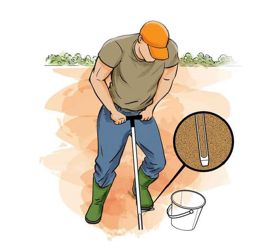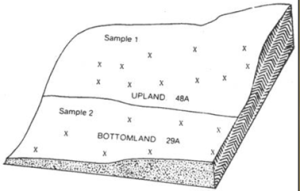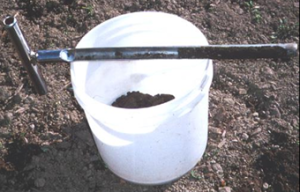We can’t manage what we can’t measure. With an accurate soil test, a strategy can be made to solve even the most difficult of problems in our pastures. When was the last time that you took an accurate soil sample in your fields? You typically need to test your soil at least once a year in late spring or early summer to help recognize what your Bahia grass or bermudagrass need. Different types and kinds of grasses require different nutrient requirements. Below I am going to share with you, how to properly take a soil sample!

Soil Sampling Step by Step

Figure 1: Take your sub-samples in different areas in your pasture. This is a great example of randomization in a pasture.
- Get a bucket or an arrow-head shovel (or use a soil probe)- roughly divide the property into sample areas (Z form, randomization, etc.)
- Your sample area should be uniform, no major rise in elevation or pons. Sample these different areas as their own sample.
- Within the same sample area, you need to collect roughly 15-20 “cores” of soil by digging the shovel into the ground and pulling up a handful of the soil profile. (4-6 inches below the surface).
- Repeat this and put the 15-20 cores into the same bucket.
- Mix the 15-20 cores together to get a rough estimate of all the soil in your sample area.

Figure 2: Typical soil probe and a bucket that you can use to collect the “Core” samples.
- Put about a cup worth of soil from the bucket into a paper bag.
- Label paper bag with your name, date, type of grass, and name of place or field you got it from.
- Repeat the process if you are sending more than one sample (if your property is not uniform and you decide two or more separate samples is better than one).
- Bring your sample to the Bradford County Extension Office and a check made out to the University of Florida ($10 per sample).
- You also want to fill out this form when you bring in the sample:
- Bermuda Varieties: https://edis.ifas.ufl.edu/pdffiles/SS/SS18600.pdf
- Bahia Varieties: https://edis.ifas.ufl.edu/pdffiles/SS/SS59700.pdf
If you have any questions, please do not hesitate to contact me. You should receive an email with your soil sample results from the UF Soils Lab within 7-14 business days. Once you receive your results, you can contact me to see what fertilizer application your soil needs!
 0
0
